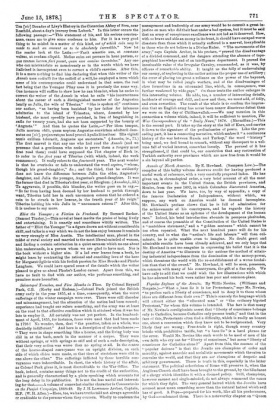Popular Defence of the Jesuits. By Willis Nevins. (Williams and
Norgate.)—" What a.base lie it is for Protestants," says Mr. Nevins, "to profess such a liberty of conscience, and to deny it to those whose ideas are different from their own !" This is scarcely the language which will attract either the "educated man" or "the ordinary bigoted Protestant," for whom this volume is intended. The fact is that many of Mr. Nevins's coreligionists assert that "liberty of conscience Wongs only to Catholics, because Catholics only possess truth ;" and that in the face of this, Protestants often find a difficulty, which is really an honest one, about a concession which they know not to be reciprocated. Very likely they are wrong ; Free-trade is right, though every country bristle with prohibitive tariffs, but "a base lie " is a hard phrase for the error. Would Mr. Nevins like such words to be used of men of his own faith who cry out for " liberty of conscience," but mean " liberty of conscience for Catholics alone ?" Apart from this, the essence of the " popular defence " is that the Jesuits are champions of order and morality, against anarchic and socialistic movements which threaten to convulse the world, and that they are not champions of despotic and arbitrary government. There is truth in this, especially in the latter statement. The political eclecticism of Rome will preserve it, when the Anglican Church shall have been brought to the ground, by the blindness of a clergy which identifies it with a doomed policy. Still, champions, however earnest and single-minded, do not always commend the cause for which they fight. The very general hatred which the Jesuits have aroused must mean something more than the natural hatred which evil has of good. A. Pope—prepared for his work, like all his predecessors, by God—condemned them. There is a noteworthy chapter on "Queen
Elizabeth and the Jesuits." Campion and his fellows suffered, it would seem, because they did not rightly understand Papal infallibility. They supposed that the Bull excommunicating and depriving Elizabeth was an infallible utterance, whereas it was not. Very good ; but did not Mr. Willis Nevins write, a few months ago, in a letter to this journal (February 23rd), that "in the reign of Elizabeth Catholic priests and laymen, yea, poor old women even, were strung up simply for religion ?'" But now ho says, "Would that the Vatican Council had been held in the reign of Elizabeth ; how many lives, Campion's among them, would have been spared !" But how could they have been spared, if they suffered simply for " religion ?"



































 Previous page
Previous page